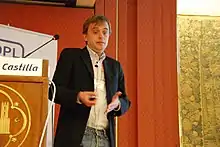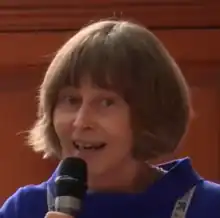| Royal Society Milner Award and Lecture | |
|---|---|
| Awarded for | "outstanding achievement in computer science by a European researcher" |
| Presented by | The Royal Society |
| Reward(s) | £5,000 |
| First awarded | 2012 |
| Website | Milner Award and Lecture |
The Royal Society Milner Award, formally the Royal Society Milner Award and Lecture, is awarded annually by the Royal Society, a London-based learned society, for "outstanding achievement in computer science by a European researcher". The award is supported by Microsoft Research and is named in honour of Robin Milner, a prolific pioneer in computer science[1] who, among other contributions, designed LCF and the programming language ML.[2]
Recipients should be active researchers in computer science who are either European or have resided in Europe for at least 12 months prior to their nomination. Winners receive a bronze medal and a personal prize of £5,000 and are invited to deliver a public lecture on their research at the Society. The Council of the Royal Society chooses recipients on the recommendation of the Milner Award Committee. The Committee is made up of Fellows of the Royal Society, Members of the Académie des sciences (France), and Members of Leopoldina (Germany).[1]
Preceding the Milner Award was the Royal Society and Académie des sciences Microsoft Award, which rewarded scientists in Europe for advancements in science using computational methods. It lasted from 2006 to 2009 until it was replaced by the current award.[3] The ACM SIGPLAN Robin Milner Young Researcher Award is a similar award rewarded for "outstanding contributions by young investigators in the area of programming languages".[4]
Recipients
The inaugural winner Gordon Plotkin received his prize in 2012[5] but delivered his public lecture in 2013,[6] the same year as Serge Abiteboul. In 2018, Marta Kwiatkowska became the first female recipient of the award.[7] Although the 2019 recipient Eugene Myers is American, he moved to Dresden, Germany, in 2012 to become a director of the Max Planck Institute of Molecular Cell Biology and Genetics,[8] thus meeting the criteria for a researcher who is European or has lived in Europe for at least 12 months. Due to infection control measures taken because of the COVID-19 pandemic,[9] the 2020 lecture was held as a Zoom webinar.[10]
| Year | Image | Recipient | Nationality | Rationale | Ref |
|---|---|---|---|---|---|
| 2012 |  |
Gordon Plotkin | British | "for his fundamental research into programming semantics with lasting impact on both the principles and design of programming languages" | [11] |
| 2013 |  |
Serge Abiteboul | French | "for his world leading database research with significant scientific and industrial impact" | [12] |
| 2014 | – |
Bernhard Schölkopf | German | "for being a pioneer in machine learning whose work defined the field of 'kernel machines' which are widely used in all areas of science and industry" | [13] |
| 2015 |  |
Thomas Henzinger | Austrian | "for his fundamental advances in the theory and practice of formal verification and synthesis of reactive, real-time, and hybrid computer systems" | [14] |
| 2016 |  |
Xavier Leroy | French | "for his exceptional achievements in computer programming which includes the design and implementation of the OCaml programming language" | [15] |
| 2017 | – |
Andrew Zisserman | British | "for his work on computational theory and commercial systems for geometrical images and as a pioneer in machine learning for vision" | [16] |
| 2018 |  |
Marta Kwiatkowska | Polish | "for her contribution to the theoretical and practical development of stochastic and quantitative model checking" | [17] |
| 2019 |  |
Eugene Myers | American | "for his development of computational techniques that have brought genome sequencing into everyday use, underpinned key biological sequencing tools, and made large scale analysis of biological images practical" | [18] |
| 2020 | – |
Cordelia Schmid | French | "for her work in computer vision and her fundamental contributions to the representation of images and videos for visual recognition" | [19] |
| 2021 |  |
Zoubin Ghahramani | British / Iranian | "for his fundamental contributions to probabilistic machine learning" | [20] |
| 2022 | – |
Yvonne Rogers | British | "for contributions to Human-Computer Interaction and the design of human-centred technology" | [21] |
| 2023 |  |
Stéphane Mallat | French | "for his key advances in the fundamental principles of wavelets, including theory for audio, image and video processing, his entrepreneurship, and for contributing significantly to advancing the understanding of deep neural networks" | [22] |
| 2024 | .jpg.webp) |
Artur Ekert | British / Polish | "for his pioneering contributions to quantum communication and computation, which transformed the field of quantum information science from a niche academic activity into a vibrant interdisciplinary field of industrial relevance" | [23] |
See also
References
- 1 2 "Royal Society Milner Award and Lecture Now Accepting Nominations". HPCwire. 15 January 2020. Archived from the original on 11 May 2021. Retrieved 11 May 2021.
- ↑ "Obituaries: Robin Milner, 1934–2010". Department of Computer Science and Technology, University of Cambridge. Archived from the original on 23 March 2021. Retrieved 10 May 2021.
- ↑ "Past medals, awards and prize lectures". The Royal Society. Archived from the original on 11 May 2021. Retrieved 11 May 2021.
- ↑ "Derek Dreyer receives Robin Milner Young Researcher Award". Max Planck Institute. 13 September 2017. Archived from the original on 11 May 2021. Retrieved 11 May 2021.
- ↑ "Gordon Plotkin". The Royal Society. Archived from the original on 29 April 2021. Retrieved 29 April 2021.
- ↑ "From logic to computer science: a linguistic journey". The Royal Society. Archived from the original on 27 April 2021. Retrieved 27 April 2021.
- ↑ "Marta Kwiatkowska – Biography". Department of Computer Science, University of Oxford. Archived from the original on 23 April 2021. Retrieved 12 May 2021.
- ↑ "Eugene Myers will lead new Systems Biology Center". Max-Planck-Gesellschaft. 4 June 2012. Archived from the original on 29 April 2021. Retrieved 29 April 2021.
- ↑ "The Royal Society, London". The Royal Society. Archived from the original on 30 April 2021. Retrieved 30 April 2021.
- ↑ "Automatic understanding of the visual world". The Royal Society. Archived from the original on 27 April 2021. Retrieved 27 April 2021.
- ↑ "Gordon Plotkin". University of Edinburgh. Archived from the original on 12 May 2021. Retrieved 12 May 2021.
- ↑ "Serge Abiteboul". ENS Paris-Saclay. Archived from the original on 12 May 2021. Retrieved 12 May 2021.
- ↑ "Royal Society Milner Award for Bernhard Schölkopf". Max Planck Institute for Intelligent Systems. 1 August 2014. Archived from the original on 2 February 2017. Retrieved 12 May 2021.
- ↑ "Thomas Henzinger to receive Royal Society Award". IST Austria. 20 July 2015. Archived from the original on 12 May 2021. Retrieved 12 May 2021.
- ↑ "Dr Xavier Leroy, recipient of the 2016 Royal Society Milner Award". France in the United Kingdom. 17 March 2017. Archived from the original on 6 August 2020. Retrieved 14 May 2021.
- ↑ "Five Oxford academics honoured by the Royal Society". University of Oxford. 19 July 2016. Archived from the original on 12 May 2021. Retrieved 12 May 2021.
- ↑ "Professor Marta Kwiatkowska announced as Milner Award Medallist". Department of Computer Science, University of Oxford. 18 July 2017. Archived from the original on 12 May 2021. Retrieved 12 May 2021.
- ↑ "Eugene Myers receives Milner Medal from the Royal Society". Max Planck Institute of Molecular Cell Biology and Genetics. 3 December 2019. Archived from the original on 12 May 2021. Retrieved 12 May 2021.
- ↑ "The Royal Society Milner Award and Lecture for Cordelia Schmid". PRAIRIE. 4 December 2020. Archived from the original on 12 May 2021. Retrieved 12 May 2021.
- ↑ "Professors among the 2020 Royal Society medal and award winners". Department of Engineering, University of Cambridge. 4 August 2020. Archived from the original on 12 May 2021. Retrieved 12 May 2021.
- ↑ "Congratulations to Prof Yvonne Rogers – Winner of the Royal Society's Milner Award!". University College London Interaction Centre. 26 August 2021. Archived from the original on 26 August 2021. Retrieved 29 August 2021.
- ↑ "The Royal Society announces this year's medal and award winners". Royal Society. 24 August 2022. Retrieved 26 August 2022.
- ↑ "The Royal Society announces this year's medal and award winners". Royal Society. 30 August 2023. Retrieved 1 September 2023.
External links
- "Milner Award and Lecture". The Royal Society.